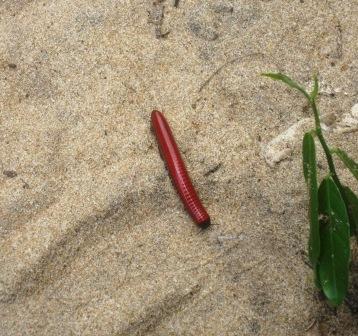Losers Take All
15 October 2012Thought, Word, Deed
8 November 2012Their red bodies are clearly visible on the pathways, on branches, on leaves, their tracks distinctive in the sand. They are a type of what I have always called “shongololos”. In English millipedes, in American who knows?
I like words, and I like the sound of words, so “shongololo” says a lot more to me than millipede. I believe this is true of most of us, we have an affinity to certain words, and they have peculiar pertinence for us even meaningless words and expressions. I remember a shop assistant who kept proclaiming excitedly, “yummy bananas” in response to every comment and action.
In a number of cultures in the world, a person’s name is important and has significance in terms of culture, or the family unit. Sometimes they are linked to the faith of the family, or to an historic event, or simply something that really impacted the parents around the time of conception or birth. I think we have lost a lot in my culture by simply choosing names that we like for our children, instead of thinking out what would be a good, powerful name to serve as a reminder of who they are every time they are called.
A friend of mine many years ago was a bookkeeper for a large utilities company in Swaziland. She was responsible for the payroll. Procedures were fairly informal in those days, and so workers simply gave their names verbally when they went onto the register. One of her more favourite characters was “Doughnut” Nkambule. She was intrigued by this name and often wondered how he came by it, how his parents would have known about doughnuts which were not readily available in Swaziland in those days. Then a new tax law was introduced and everyone had to produce their birth certificates to prove they were who they said they were. Imagine her surprise when her “Doughnut” turned out to be “Donald”.
I worked with a man whose first names were Noah Mkhumbi. Mkhumbi is the siSwati word for boat, a clever link by his parents. I don’t remember why they gave him these names, but in my imagination I see a flooded river and a desperate boat trip to get to the maternity hospital on time.
Recently the entire twitching community was up in arms over the re-naming of birds. I am not sure if this was only in Africa or worldwide. The outcry was certainly monumental enough to be global. The rationale behind this massive exercise was quite logical: the same bird in Kenya is called by a different name in Madagascar; a finch in Zambia is something else in Uganda. This was causing confusion in the avian world and so it was decided that in the interests of accuracy, uniformity of nomenclature was the route to take.
Words can be confusing. Languages are living and evolve constantly as the human races progresses. My faithful old Oxford Students Dictionary is hopelessly out of date and many everyday words we now use cannot be found in it – a serious drawback for someone who is setting out to be a writer and author of note. Throw different connotations into this and you can be further confused. New meanings are given to old words and if you don’t keep up with the modern usage you may well find yourself in an embarrassing situation. Such as has happened to me recently.
I have long joshed friends from across the pond that American is a completely different language to English. I believe it was Scott who gently told me, when I was talking about a series of children’s books based on the antics of my beloved cat, that the word “Snatch” has a rather smutty connotation in America. I ingested this information and felt a little bewildered. What to do?
You see, in true African tradition, her name is linked to her arrival in our household. She was brought to me by none other than the Duracell man, Jaime himself. He arrived one day with this minuscule, spikey haired, green-eyed, underage feline in a plastic bag. I felt she had been snatched from the fate of feral survival as a Mocambican Kraal special and named her accordingly. Friends of mine called their rescue cat Miss BIB, short for “Bum in Butter”, a clever and apt description. After her tumble from the rafters I did think of “Crash” as an alternative, but it doesn’t quite fit the bill. “Crash Tales” doesn’t have the same ring as “Snatch Tales”.
Snatch is a perfectly acceptable English word with a definition that implies grabbing, quickly taking, or a small excerpt of music. How anyone could make the mental leap between the verb, “snatch”, and the noun “vagina” is beyond me. In actual fact, I feel slightly offended by it, both as a woman and as someone who loves semantics.
After serious consideration and reflection, the decision I have taken was really very easy. My cat’s name is Snatch!


1 Comment
f it makes you feel any better, my American mind never even considered the potentially vulgar connotations of your cat’s name. Although it wouldn’t be the first time a feline has shared a name with female parts. Strange…. At any rate. Love this post. I keep saying “Donald” to myself in the accent that would make it sound like “Doughnut” and it makes me smile. I love learning someone’s name and then hearing that there is, indeed a story behind it. There needs to be more of that in the world.